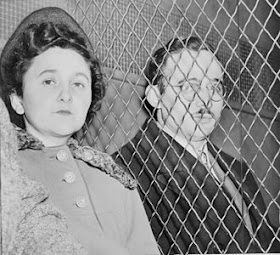Gentle Readers . . . and Maxwell,
As we continue with connections to my current
Battle of the Bands song, Strange Fruit, I have a summary for you of the case of Julius and Ethel Rosenberg, which is so complicated that I can't possibly unravel it in a blog post. However, many sources are available online for further reading.
In 1951, Julius and Ethel Rosenberg, a married couple with two young children, were convicted of espionage for leading a spy ring that provided atomic bomb information to the Soviet Union. On June 19, 1953, they were executed in the electric chair at Sing Sing Prison in Ossining, New York––first Julius and then Ethel. Julius was 35, and Ethel was 37.
Calling the case "controversial" is quite the understatement.
Were they guilty? Were they victims of anti-communist hysteria in the U.S.? The answer to both of these questions is yes.
During the two years between the conviction and execution, and in the decades since, their supporters have argued that they were innocent, that they were framed, and finally, have been forced to acknowledge that they bore some guilt. The execution seems to have been an insane overreaction.
Here are the basic facts:
- The U.S. did not share information about the atomic bomb program with their allies during World War II, the Soviet Union.
- In 1949, the U.S. government was shocked when the Soviet Union tested an atomic weapon.
- In 1950, the U.S. learned that a physicist and German refugee working on the Manhattan Project gave information about atomic weapons to the Soviets throughout the war. Fuchs said his courier was a man named Harry Gold.
- In May, 1950, Harry Gold was arrested and confessed. He identified David Greenglass as another participant in the scheme. Greenglass was a machinist in the U.S. Army who was assigned to the top-secret Manhattan Project at the Los Alamos National Laboratory in New Mexico.
- In June, 1950, David Greenglass was arrested and confessed to giving secrets to Gold, who passed them on to the Soviet Union.
- David Greenglass also identified Julius Rosenberg, an electrical engineer who was his sister Ethel's husband, as the person who persuaded Greenglass's wife, Ruth, to recruit him and said that Julius Rosenberg gave atomic secrets to the Soviets.
- Rosenberg's Soviet contact agent was Anatoly Yakovlev, to whom Rosenberg provided numerous documents and drawings connected with atomic secrets.
- Morton Sobell, another accused conspirator, took off for Mexico City. He was extradited to the U.S. and was tried with the Rosenbergs for conspiracy to commit espionage.
So what was the case against Ethel Rosenberg? Not much, but she became part of the ploy to convict Julius because the idea of a very stiff penalty against both of the Rosenbergs was supposed to make Julius confess. David and Ruth Greenglass, in exchange for charges against Ruth being dropped, changed their testimony from David passing secrets to Julius Rosenberg on a street corner in New York City to David passing secrets to Julius in the Rosenberg's apartment, which Ethel then typed up in their living room.
The ploy didn't work the way that government prosecutors thought it would. Julius and Ethel Rosenberg were called to testify before a grand jury and were indicted along with David Greenglass and Anatoly Yakovlev. During the grand jury hearing and at their trial, the Rosenbergs never implicated anyone else. They refused to incriminate themselves. The judge in their trial sentenced them to death for conspiracy and blamed them for American deaths in the Korean War. They were the only two people to be executed for conspiracy during the Cold War.
Up to the last minute before their executions, Ethel was told she could save herself by admitting that her husband was guilty, but she wouldn't do it.
Jean Paul Sartre said the executions were a "legal lynching."
And what happened to others who were accused?
Harry Gold was convicted and served 15 years.
Klaus Fuchs was convicted in Great Britain and served nine years and four months.
Martin Sobell was convicted and sentenced to 30 years in prison. He served 17 years and nine months. In 2008, he admitted he was a Soviet spy.
David Greenglass was sentenced to 15 years in prison, served 10, and went home to his wife Ruth. They lived under assumed names. In 2001 he recanted his testimony against his sister and admitted that he lied to spare his wife and their children. Ruth died in 2008 at age 83. David died at age 92 in 2014.
Yes, Julius Rosenberg was guilty, but Sobell and other sources have claimed that the information Julius Rosenberg passed to the Soviets was of little value.
Ethel was probably guilty of hiding money for Julius. She also allegedly asked her sister-in-law Ruth to convince David to join Julius in the spy ring. All four, along with Martin Sobell, were members of the American Communist Party.
Julius and Ethel Rosenberg could not possibly have deserved the punishment they received.
When they were executed, their sons Michael and Robert were ten and six years old.
Next time, what happened to Michael and Robert and how is the author of
Strange Fruit involved?
Infinities of love,
Janie Junebug
If you haven't voted in my Battle of the Bands, please check it out at
http://dumpedfirstwife.blogspot.com/2017/10/battle-of-bands-strange-fruit.html. The song is
Strange Fruit. The contenders are Nina Simone and Billie Holiday.














